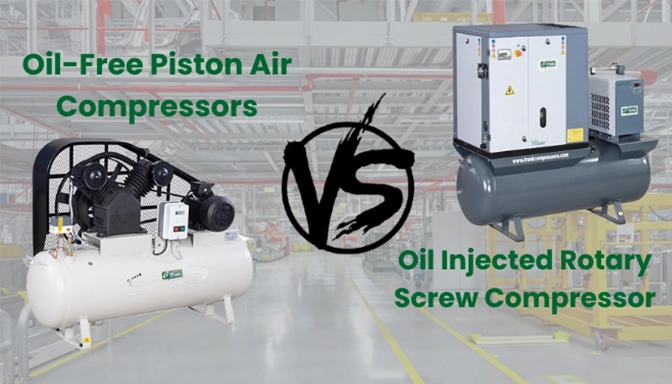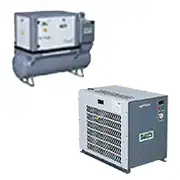How To Pick The Right Compressor For The Textile Industry?
Air compressors are essential in the textile industry. These machines assist in driving various processes like spinning and weaving, dyeing, and finishing. The selection of a suitable compressor type may influence production quality, the costs, and the life of the equipment. There are two types of compressors, such as oil-free and Oil-Lubricated Air Compressors. Each has its features, advantages, and drawbacks. This blog is going to discuss the difference between the oil-free compressor and the oil-lubricated compressor and which one is the most suitable when it comes to textile applications.

Understanding Air Compressors in Textile Production
Air compressors operate by converting energy into pressurized air. This pressurized air is used to run the machines and tools in the production of textiles. Compressors are often divided into two main types based on lubrication:
-
Oil-Free Compressors
-
Oil-Lubricated Air Compressors
Both types differ in the method that makes them handle internal lubrication, yet the basic functions that the two types perform remain the same.
What Is an Oil-Free Compressor?
Oil-free or non-lubricated compressors do not apply oil in the chamber. Instead, they are made with special coatings or self-lubricating substances to minimize friction. These machines are meant to guarantee that the air is clean and free from oil particles.
Key Benefits of Oil-Free Air Compressors
-
Clean Air Production: Oil-free type provides air that does not contain oil. It makes them perfect for industries in which air purity is important.
-
Lower Maintenance: The machines do not require much maintenance since they do not involve changing oil and monitoring.
-
No Risk Oil contamination; Few traces of oils are capable of spoiling fabrics in processes such as dyeing or finishing of fabrics. Oil-free compressors do not have such a risk.
Limitations of Oil-Free Compressors
-
Shorter Lifespan; Without oil to reduce wear, the internal parts may wear out faster in some models.
-
Higher Initial Cost: These machines can be more expensive to purchase.
-
Not Ideal for Heavy Use: Continuous use under high pressure can cause overheating in some oil-free models.
What are Oil-Lubricated Air Compressors?
Lubricant-oil compressors use oil to cool and lubricate the interior parts. The oil also minimizes heat and wear of the machine, enabling it to work longer and efficiently. These compressors use filters or dryers to filter the oil for some industries. These compressors are found more in heavy-duty applications.
Key Benefits
-
Extended longevity of Equipment: The oil reduces friction, and the machine has to survive longer in tough conditions.
-
Better Performance: Oil-Lubricated Air Compressors often perform well in high-pressure or continuous use environments.
-
Lower Noise Levels: These machines tend to run more quietly due to better internal lubrication.
Limits of Oil-Lubricated Compressor
-
Extended longevity of Equipment: The oil reduces friction, and the machine has to survive longer in tough conditions.
-
Better Performance: Oil-Lubricated Air Compressors often perform well in high-pressure or continuous use environments.
-
Better Performance:An oil-lubricated compressor performs well and can be very successful in high-pressure or continuous use environments.
-
Lower Noise Levels:These machines tend to run more quietly due to better internal lubrication.
Limits of Oil-Lubricated Compressor
-
Greater Maintenance Need: It should be checked on the oil regularly, changed, and the filters replaced.
-
Oil Disposal Regulations: Oils used should be handled or disposed of properly.
-
The importance of Air Quality to the Textile Sector: Textile factories use air compressors for some of the utilities, such as :
-
Operating pneumatic tools.
-
Spinning and weaving.
-
Powering dyeing and finishing equipment.
-
Packaging and labeling.
Some of these steps require air purity. When the oil particles come to the air supply, they may stain material, block sensors, and damage valves or air jets. This not only affects the quality of the products but also causes equipment downtime and requires repairs.
Comparison of Oil-Free & Oil-Lubricated Air Compressors for Textile
| Feature |
Oil-Free Compressors |
Oil-Lubricated Compressors |
| Air Quality |
Oil-free compressors deliver oil-free or clean air. |
Oil-lubricated may release a small quantity of oil into the air |
| Maintenance Needs |
These models require low maintenance because they do not involve the use of oil. |
This type needs more attention for regular oil changes. |
| Life Expectancy |
Intensive use can damage the oil-free models more quickly. |
This can last longer when they are maintained properly. |
| Cost |
There are more expensive oil-free compressors that can save in the long term. |
These models have a low initial cost but are expensive in the long run. |
| Use in Delicate Applications |
This model works for a clean air process, such as dyeing or finishing |
This is not the best for a dyeing or finishing unit. |
| Noise Level |
These are noisier to operate. |
These run more quietly. |
| Continuous Operation |
It is more appropriate for short-term or moderate use. |
It is better for a lot of working hours. |
Cost Vs Quality In Textile Use
-
Although oil-free compressors are initially more expensive, they tend to save a lot in the long term.
-
They assist in avoiding damage to fabrics, loss of the product, and minimizing air system maintenance.
-
Oil-lubricated air compressors might appear economical during the initial days, but they might end up exposing more hazards to oil contamination.
-
This may lead to costly cleaning or machine repair, or even a recall of fabrics.
-
Oil-free compressors provide cleaner, safer air at your textile plant when you are handling fine cloth or operating automatic dyeing machines.
-
An oil-lubricated unit can work better in case your operation requires heavy weaving or spinning, which requires airflow at all times.
Factors of Safety and Compliance
The air purity standards are highly needed in many textile units. These regulations help create the safety of workers and the quality of fabrics. Using an oil-free compressor can make it stay in compliance. They also reduce the possibility of fire or explosion as a result of accumulated oil in pipelines.
Use of energy and energy efficiency
-
Oil-lubricated compressors are more energy efficient when conducted on a large scale. They do not produce much heat and can take more loads easily.
-
The oil-free may use more energy when used extensively, particularly in hot climates. It is important to compare according to its power rating and its operation cycle.
Installation and Space
-
Oil-free compressors are usually smaller and lighter. This allows for easy installation in tiny areas. Oil drainage systems are also not necessary, and this saves space.
-
Conversely, the Oil-Lubricated Air Compressors tend to require a lot of space and proper oil handling systems.
Choosing the Right Compressor for Your Textile Factory
Here are a few key points to assist in guiding your preference:
-
Consider Air Purity Needs: Choose oil-free if clean air is your top priority
-
Think About Workload: For heavy-duty, round-the-clock use, oil-lubricated units may last longer.
-
Check the Environment: In dusty or humid areas, sealed oil-free units may perform better.
-
Look at Total Cost:Add up purchase cost, maintenance, energy use, and product safety to find your best fit.
-
Plan for Growth:Pick a system that supports future expansions or process changes.
Choosing The Best Air Compressor For Textile Industry Use
In the textile factory, clean and constant compressed air is required to maintain efficient operation. The decision to use oil-free and Oil-Lubricated Air Compressors comes down to your needs. The clean air guaranteed by oil-free models has a low risk of fabric damage, and it is less expensive to maintain. Oil-based compressors offer standards for extensive usage and good life expectancies, but possibly higher risk of contamination.
Both of them are valuable. A close examination of your processes, environment, and type will help you make the right decision. It is important to balance air quality, cost, reliability, and efficiency in order to maintain your textile production. If you want an efficient Air compressor for your textile industry, Frank Compressor manufactures for your specific needs. We also provide oil-free screw compressors, oil-free piston compressors, and more for different industries. Contact the best textile air compressor manufacturer in Coimbatore for high-quality air compressors.































